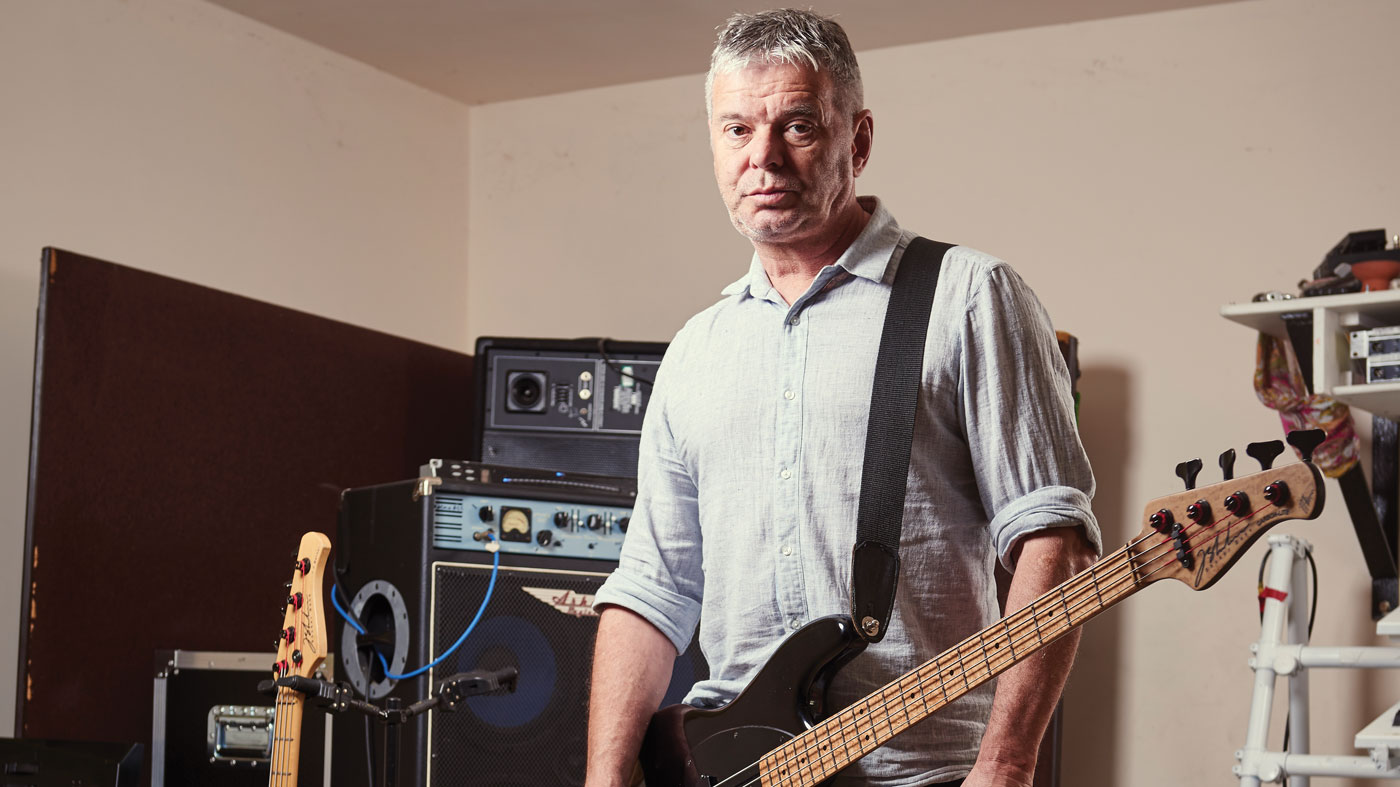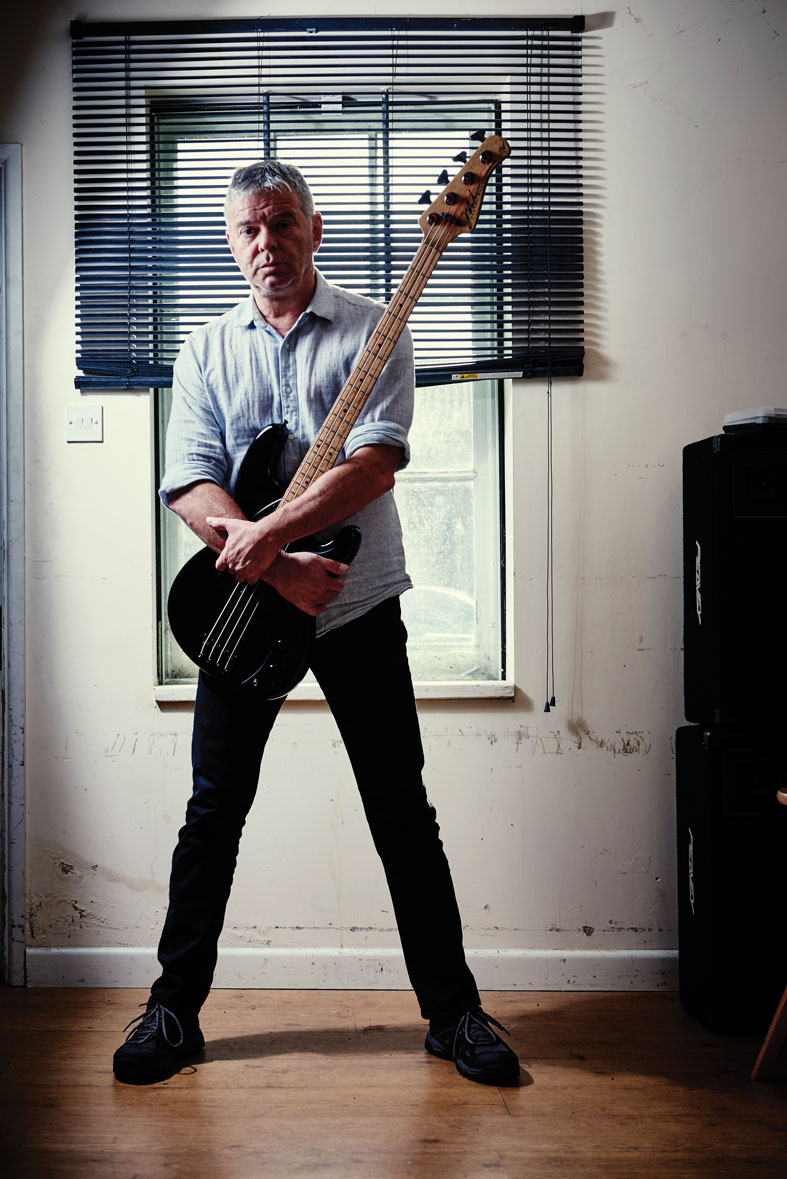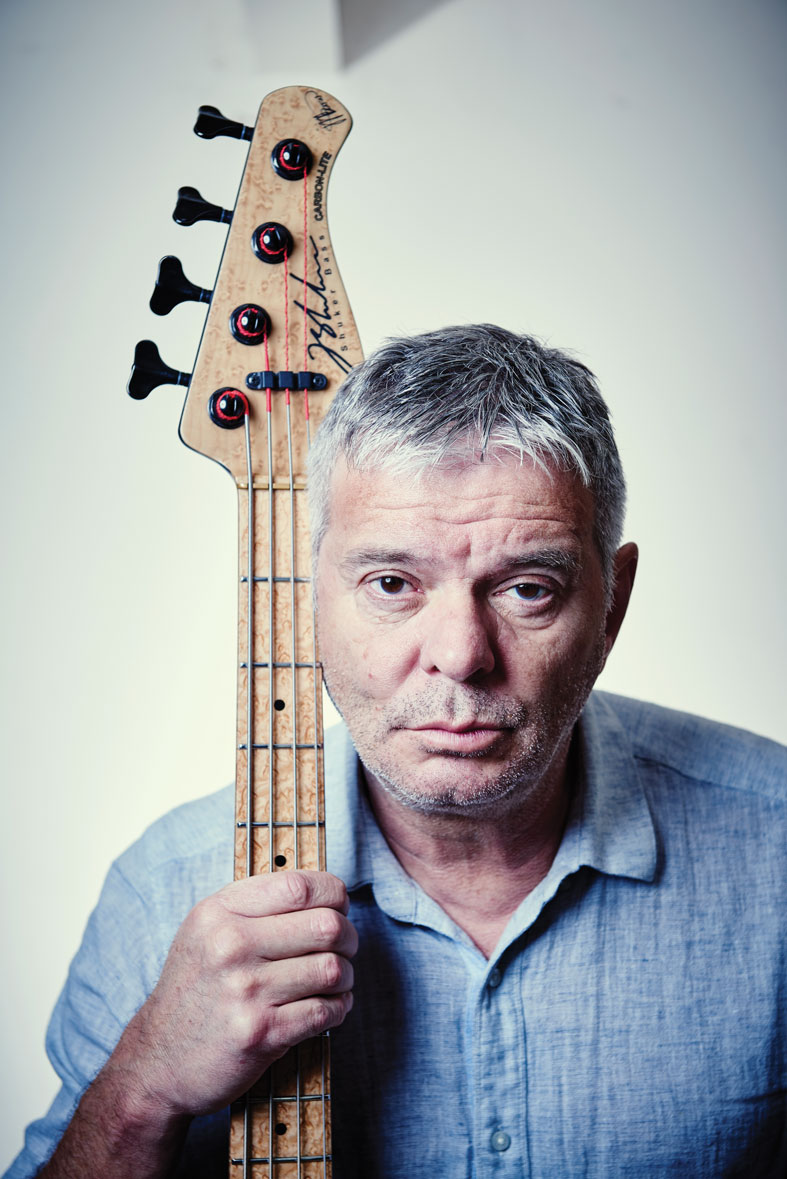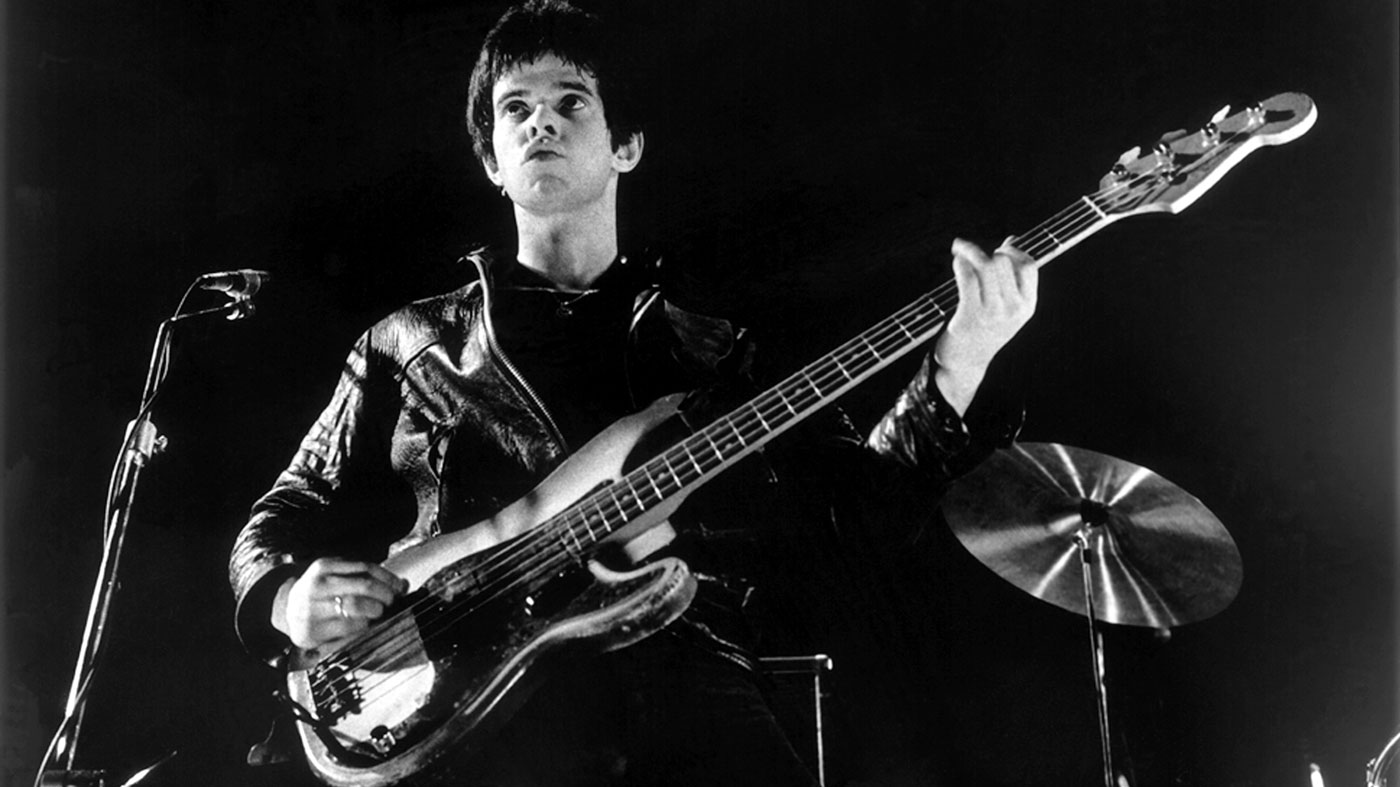The Stranglers' Jean-Jacques Burnel: “We try to rehearse without looking at our guitars, so you're free to play with the song”
The high-kicking bassist on flow, inspiration and hearing loss

Want all the hottest music and gear news, reviews, deals, features and more, direct to your inbox? Sign up here.
You are now subscribed
Your newsletter sign-up was successful
44 years since they formed, the Stranglers are busier than ever before. Bassist extraordinaire Jean-Jacques Burnel explains how he continues to defeat the paradigm, armed with a state of pure mental flow and some mouthwatering bass gear...
Not punks, but accepted by the punks because they looked hard and played aggressively. Not prog, even though they played songs in ‘difficult’ time signatures. More than rock, bigger than pop... the Stranglers were and remain all those things and more, a unique band of personalities who defy categories and have done since they were formed all the way back in 1974.
I live in the mountains in the south of France, so I can f*** off on my motorcycle for a few days with a sleeping bag and get lost
That the Somerset-based group - Jean-Jacques Burnel (vocals, bass), Baz Warne (guitar), Dave Greenfield (keyboards) and Jet Black (drums) - are not only still going, but are busier than ever, is very much an achievement by anyone’s standards.
“Over the last five or six years, we haven’t stopped,” says Burnel, sipping a cuppa in the rehearsal room at Stranglers HQ near Bath. “We’re fulfilling a demand to play everywhere. Any musician would jump at that chance, to be honest. We’ve been all over the world lately, and doing lots of tours and festivals.”
“That said,” he reflects, “being that busy doesn’t give you the time to collect your thoughts and see what you want to do musically. There comes a time when you really need to collect your thoughts.”
What does that take - a week off? “It needs a bit longer than that!” he laughs. “I’m lucky because I live in the mountains in the south of France, so I can fuck off on my motorcycle for a few days with a sleeping bag and get lost. That brings you back down to a state of what the Japanese call mushin, empty mind, and that’s when you can start getting creative. I’ve got about 150 songs that I need to cull and go through and see if they actually make sense.”
Norfolk and chance
We last featured Burnel in 2014, when he told us that the Stranglers were at a decision point. This was largely down to the health of drummer Jet Black, then 75 years old and battling illness; the situation was resolved when Black stepped down from touring, with his place taken for gigs by Jim MacAulay. Since then the band haven’t stopped moving, travelling upwards from a place of genuine despair in the 1990s.
Want all the hottest music and gear news, reviews, deals, features and more, direct to your inbox? Sign up here.
I suppose I was semi-detached from the Stranglers; I’d lost my mojo, I believe is the expression
“20 years ago we were at rock bottom, after Hugh [Cornwell, frontman] had gone,” recalls the bassist. “Our record contracts weren’t renewed and we went around in ever-decreasing circles for quite a few years. I lost interest as well. I suppose I was semi-detached from the Stranglers; I’d lost my mojo, I believe is the expression. I’d also lost my mate Hugh; we used to bounce off each other, because that was the best way to write songs. Then Baz joined the band and we started writing again, because now I had someone to write with.”
Does inspiration flow as easily as ever, after all these years?
“Well - you’re a bass player, you know what it’s like. There’s nothing better than playing your chosen instrument with people around you who are up for listening to it. The Stranglers has always relied on being a tight unit, rhythmically, and I’ve got some good basses.”
At this point Burnel hands me his main Jon Shuker bass, a beautiful instrument built along the lines of the Fender Precisions which he played for years.
“It’s basically a copy of a Fender P, but slightly better,” he says. “The quality of finish is light years ahead. There’s about six different woods in the body and there are empty resonance chambers in the body, plus it has a carbon graphite neck. I have two of these. It’s passive but the output is phenomenal.”

At 65, Burnel is famously youthful-looking, presumably due to a lifetime of martial arts and a seventh dan in karate. But a heavy bass will take its toll on anyone if you play it long enough, and the relatively lightweight Shuker has been a godsend in that respect, he says.
“My back is much better these days, now that I’ve got a much lighter guitar. You spend four or five hours in here with a heavy Fender P and it’ll make your stance off-sided. That’s one of the reasons why I had this one built.”
Another pitfall of older age which we can all look forward to is diminishing hearing, of course.
As Burnel explains: “I prefer in-ear monitors; they help lessen the sound on stage, and it helps the audience have a better sound because the out-front man can control it better. We had them moulded, which is expensive but worth it, and during the moulding the woman told me, ‘You’re a bass player; you shouldn’t be losing your hearing as much as you have. What else do you do?’ and I said ‘I’ve been riding motorcycles since I was 16’ and she said ‘That’s it!’ The wind noise was what did it.
“You know how the guitarist and the drummer are always the first to lose their hearing? Drummers suffer because of the cymbals. Well, it was the wind for me, because I never wore earplugs when I was riding. I wear them now...”
Digging in
As we set up for the photoshoot, Burnel runs the Shuker through its paces, delivering his famous thunderous tone through his signature Ashdown JJB500 rig. For the Stranglers’ forthcoming March tour dates, he’ll be bringing some serious amplification along.
“I’ve been using 8x10s and a couple of 15s, live,” he says. “The sound I get is a combination of what the soundman does and how I play it. It’s all in the hands.” He illustrates this last point with a fearsome blast of distortion, achieved by digging the pick in hard near the neck. “I have a couple of tones. Sometimes I use fingers, sometimes a pick, it depends on what’s needed. I think it'd be disingenuous just to use my heavy, growly bass sound on every single song.”
Flow? It’s a moment of ecstasy. You’re not looking at your frets, and everything just works
When we ask him how he’s evolved over the years as a bass player, he explains “I’m not as busy a player as I might have been at some points,” which develops into a conversation about less being more in bass world - and then a related discussion about the concept of ‘flow’, the intuitive frame of mind which all musicians love.
“It’s rare, isn’t it?” he ponders. “Those moments when you’re at the right tempo, you’re playing the right notes, the groove is just perfect, the harmonies are right, you can hear everything clearly... it’s a moment of ecstasy. You’re not looking at your frets, and everything just works. The next night, you’re fumbling all over stuff, but there are times when your fingers automatically go where they’re supposed to go.

“We try to rehearse without looking at our guitars,” he explains. “Sometimes we fuck up, but the more you can do that, the more you know the piece and the more you’re free to play with it. You don’t need to concentrate on the song and you can look at the audience.
“Of course, you might hit the wrong fret while you’re rehearsing, but usually by the time of the gig I can play most of the songs, including some of the fast runs that I do, without looking. If you know the material that well, then you’re free, and you can adapt it to who you are at that moment. And then you’re not going through the motions; you’re playing the same notes but they sound different, because you feel different.”
Although the Stranglers aren’t close to being a jam band, focusing on tight, economical songwriting, they do let loose a bit on stage. “We do quite a lot of improvisation over a few chords,” says Burnel. “On Walk On By [the Bacharach/ David cover from 1978] we do quite a long extended part, which is different every time. I experiment all the time, up to the point where it sounds a bit jazzy... that’s a euphemism!”
“The point is that if you’re going to be mechanical and do the same thing every night,” he says, “you might as well give them the record. But if your music is meant to be an extension of you, in different humours on different days, that’s the magic, both for the musician and the listener.”

Stranglers 2018
So where does this leave the Stranglers in 2018? Our man sums up.
“At the moment we’re just a bunch of old bastards who are enjoying what they’re doing,” he replies diplomatically. “It’s just like anyone’s life. If you’re in a group, there’s a certain dynamic, and it’s not always the nicest dynamic because people evolve at different levels.
It’s obvious when you’re just going through the motions; the public notice that very quickly
“Once you reach a certain age, though, you’ve worked your stuff out and you’ve got a better chance of surviving together. It’s obvious when you’re just going through the motions; the public notice that very quickly. And the danger is that you’ll repeat the success you had, which is toxic. Fortunately we’ve got so many tunes to choose from that we can change the set every night, and it does; we’re not stuck.”
Did he ever look this far ahead in 1974?
“When we started out, no bands expected to last 44 years! We’re in uncharted territory,” he chuckles. “We’ve had the luxury of never disbanding, just evolving, and it’s helped me that the personnel has changed. The most important thing for me is that we’re creative, we’re productive, and we’re having a gas.
“Most of our music hasn’t dated, although some of it has, largely down to the production at the time they were recorded, but we’re still writing edgy stuff that is pertinent. We observe; I like to observe the world and know what’s happening. There’s no shortage of inspiration, and we’re not seeking commercial success. You want what you do to be loved, but if you seek that, it’s the tail wagging the dog.”
He concludes: “You don’t think that you’ll reach your 60s and still be jumping about like a teenage fool and enjoying it - with people enjoying the music, and recycling it. I see a movie, and there’s a song in there that I wrote 40 years ago! To me, that is cool.” That’s an understatement, if you ask us.
The Stranglers tour the UK this March with Therapy? in support.

